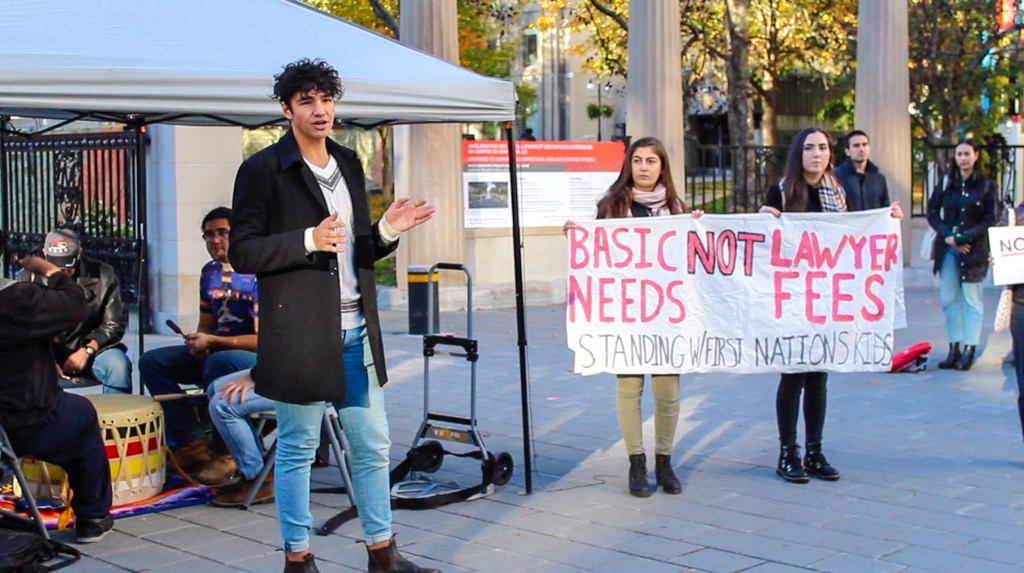The “Redmen” name was a visible and constant reminder of McGill’s historical discrimination against Indigenous students. It is with great pride that I can say that, after years of Indigenous student activism, we have successfully changed the name. While the #ChangeTheName campaign demonstrated Indigenous resilience and strength, it also rallied a tremendous level of allyship and support from our non-Indigenous peers. Our campaign would have been significantly more difficult without the support of the Students’ Society of McGill University (SSMU) team in particular. I reflect on this last statement with both optimism and hesitation.
SSMU is an unreliable institution that fails to provide consistent support and allyship to Indigenous students. It only takes one oversight—like failing to send an email—from a SSMU executive to remind us, as an Indigenous student community, SSMU is still a body that we cannot readily depend on. Some may argue that this single oversight, that this independent transgression by Vice-President (VP) Internal Sanchi Bhalla, may be insignificant enough that it fails to merit a response. However, regardless of the size or publicity of such an oversight, this lack of action serves to remind Indigenous students of the institutional barriers that force us to rely on non-Indigenous members of the SSMU executive. The failure of a SSMU representative to act in allyship reminds us of our own powerlessness within the institution, and leads us to question whether we can rely on SSMU in future circumstances, or not. While VP Bhalla has explained her lapse as a “technical error” and a simple reality of bureaucracy, what is important are not the causes of her actions but their result. This event, voluntary or not, reaffirms Indigenous students’ lack of trust in the SSMU executive, and accordingly, it must then fall to us as Indigenous students to take control over our own affairs without being forced to rely on student executives who are incapable of providing allyship.
I believe Bhalla when she explained that she was incapable of supporting Indigenous students with regards to our recent protest against the treatment of First Nations children in the child welfare system. I also believe that SSMU as an institution is not structured in a way that easily affords the executive the ability to provide the type of allyship that we require as Indigenous students. While we can understand Bhalla’s failure to provide allyship to Indigenous students as a symptom of a larger institutional issue, that merely explains, and does not excuse, the structural failures of SSMU that prevent it from prioritizing Indigenous student voices. As such, it is time that we reformed SSMU in a way that works to prioritize the needs of Indigenous and marginalized students. Indigenous student activists require a three-step reform to ensure our independence and autonomy in mobilizing to promote Indigenous issues at McGill.
First, Indigenous student activism requires fiscal autonomy, distinct from discretionary funding provided by the SSMU executive. I began the #ChangeTheName campaign without any funding and consistently relied on discretionary support from SSMU. This structure meant that I, as the head of the campaign, couldn’t plan future action without being forced to ask ‘permission’ of a non-Indigenous student executive. Indigenous students should not have to rely on the charity of SSMU when challenging an institution, especially if that institution happens to be SSMU itself. As such, I am excited to announce our proposed Indigenous Equity Fund, which Indigenous students will campaign for in the upcoming Fall referendum period.
Second, power dynamics within SSMU need to be reformed in a way that makes the Indigenous Affairs Commissioner accountable to Indigenous students, rather than the SSMU executive. The role of the Indigenous Affairs Commissioner should be to respond to concerns of Indigenous students and represent those concerns within SSMU. The Indigenous Affairs Commissioner needs to be able to hold the SSMU executive accountable if Indigenous students become anxious or feel disrespected due to the conduct of the executive. Moreso, the Indigenous Affairs Commissioner needs the flexibility to challenge the institution without feeling pressure from SSMU executive. Subverting this power dynamic means shifting the Indigenous Affairs portfolio out from under a SSMU executive, and providing an independent platform where the Indigenous Affairs Commissioner can act without concern of retaliation from the SSMU executive team.
Finally, Indigenous students require access to resources that enable rapid mobilization on issues affecting our community. By reforming the SSMU Indigenous Solidarity Policy, we can ensure that useful tools such as the SSMU listserv, room booking privileges, and seats on administrative committees are allotted to Indigenous students without having to rely on a SSMU executive. With the understanding that SSMU is simply incapable of providing the allyship that Indigenous students need, it is necessary that we acquire the means we need to help ourselves.
I firmly believe in the power of solidarity. Solidarity, community, and reciprocity are some of the most powerful methods that we have as students when challenging McGill as an institution and fighting for student rights. At the same time, I recognize that sometimes this solidarity is difficult to achieve. This fact should not bind or limit marginalized voices from acting on our own behalf. There will be those who perceive Indigenous student actions as unnecessarily divisive and overreaching. Those who make these claims simply seek to undermine and belittle the legitimate anxiety that Indigenous students feel on an everyday basis.
Instead of promoting divisiveness on campus, our plan is to increase solidarity and allyship, to promote Indigenous student autonomy, and to provide increased support for future Indigenous students. We can achieve this by striving for an increase in financial autonomy, a shift in power dynamics, and establishing control over resources that SSMU withholds from Indigenous students.









